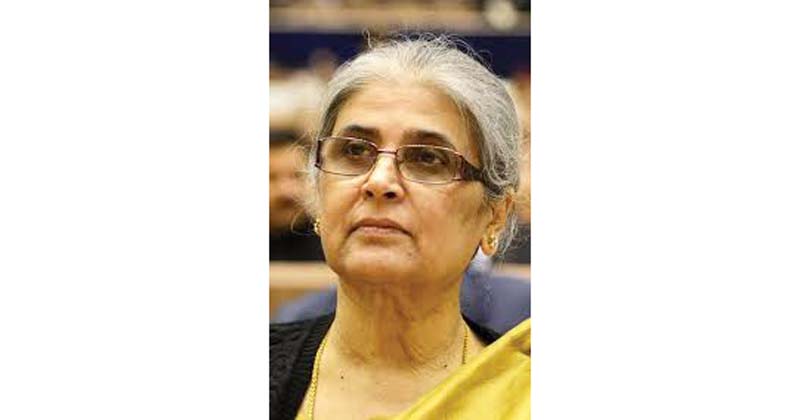Panel to invite suggestions in writing
Visit to J&K shortly
Sanjeev Pargal
JAMMU, Feb 20: Delimitation Commission chairperson Justice (Retired) Ranjana Prakash Desai will be visiting Jammu and Kashmir shortly as the Union Ministry for Law and Justice is set to extend her term beyond March 5 while the Commission is likely to invite suggestions on delimitation and reservation of Assembly constituencies in the Union Territory in writing from the political parties.
Reliable sources told the Excelsior that the Union Ministry for Law and Justice which had constituted the Delimitation Commission for Jammu and Kashmir on March 6, 2020 for fresh delimitation of 90 Assembly constituencies in the Union Territory is likely to extend the term of Justice Desai, most likely for another six months as her one-year term is expiring on March 5.
“The term is set to be extended on the ground that the Commission couldn’t complete its exercise within one-year-time mainly because of COVID pandemic,” sources said, adding the Commission held its first meeting with the Associate Members on February 18 in New Delhi.
The Government is, however, confident that the Commission will finalize its report in the next six months.
Sources said some of the officials of the Election Commission had visited Jammu and Kashmir. However, Delimitation Commission Chairperson Ranjana Prakash Desai and Election Commissioner Subash Chandra, who is also a member of the Delimitation Commission, are expected to visit the Union Territory, most likely next month especially after extension in term of the Chairperson. State Election Commissioner KK Sharma is another member of the Commission.
Sources said the Delimitation Commission is also expected to invite suggestions in writing from various recognized political parties on delimitation of Assembly constituencies.
All three Associate Members of the Delimitation Commission from the National Conference including Dr Farooq Abdullah, Mohammad Akbar Lone and Hasnain Masoodi, Lok Sabha members from Kashmir, had boycotted the meeting called by the Commission in New Delhi on February 18 on the ground that the NC has challenged Jammu and Kashmir Reorganization Act in the Supreme Court under which delimitation of the Assembly constituencies has been taken up.
However, Associate Members of the Commission from the BJP Dr Jitendra Singh, Union Minister of State in the Prime Minister’s Office (PMO) and Jugal Kishore Sharma, Lok Sabha member from Jammu-Poonch constituency had attended the meeting and gave their suggestions.
“After boycotting the meeting, whether the National Conference submits its suggestions to the Delimitation Commission in writing or not will be decided by the party after receiving the letter from the Commission,” sources said. However, the National Conference has made it clear that it will dissociate from the Commission.
While splitting Jammu and Kashmir into two Union Territories through the Reorganization Act, the Union Home Ministry had increased Assembly seats of Jammu and Kashmir by seven taking total seats to 114-24 of which are reserved for Pakistan occupied Kashmir (PoK) while election will be held for 90 seats.
Erstwhile State of Jammu and Kashmir had 111 seats including 24 reserved for PoK while elections were held for 87 seats. With creation of Ladakh as Union Territory, four seats of the region were reduced and the Assembly was left with 83 seats. However, with increase of seven seats, J&K UT will have an Assembly of 90 seats. Two Women MLAs will be nominated to the House, which was the position earlier also.
In the previous Assembly, Kashmir had 46 seats, Jammu 37 and Ladakh four.
Delimitation of the Assembly constituencies was last held in 1994-95 during the President’s Rule when seats of the erstwhile State Assembly were raised from 76 to 87. Jammu region’s seats were increased from 32 to 37, Kashmir’s from 42 to 46 and Ladakh’s two to four. However, the delimitation was freezed in 2002 by the then National Conference Government headed by Dr Farooq Abdullah in lines with the decision taken by then Central Government headed by Atal Bihari Vajpayee.
Elections to the Legislative Assembly will be held only after delimitation of Assembly constituencies is completed.
According to sources there can be altogether different Assembly constituencies with different boundaries as it will not be binding on the Delimitation Commission to stick to the segments, which existed in previous Jammu and Kashmir State Assembly.
The delimitation of Assembly seats has become necessity as it would be treated as new Assembly altogether with reservation for Scheduled Castes and Scheduled Tribes. The Scheduled Castes enjoyed reservations in the previous State Assembly also where seven constituencies were reserved for them including Chhamb, Domana, RS Pura, Samba, Hiranagar, Chenani and Ramban, all in Jammu region, while STs had been denied political reservations.
“The STs will get political reservations for the first time in the history of Jammu and Kashmir,” sources pointed out.
It may be mentioned here that seats reserved for SCs had to be rotated after every two terms but in the erstwhile J&K State Assembly, four elections were held on the same reserved seats without rotating them. The Delimitation Commission could now reserve seats in different areas for the SCs, they said.


